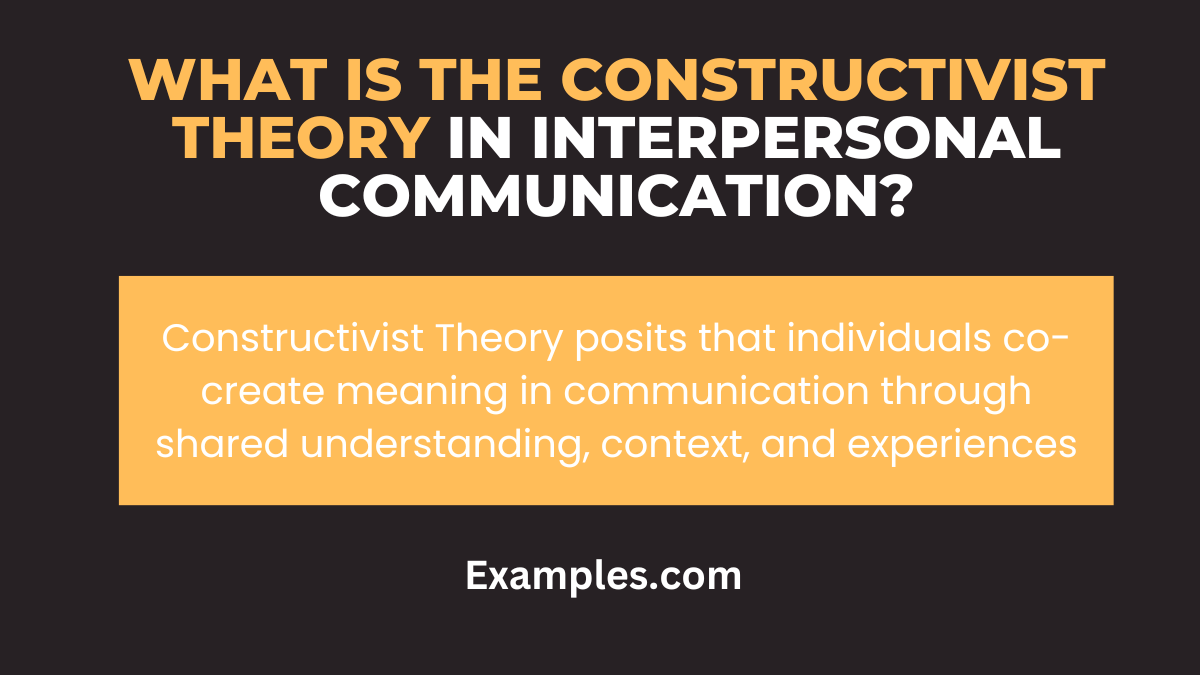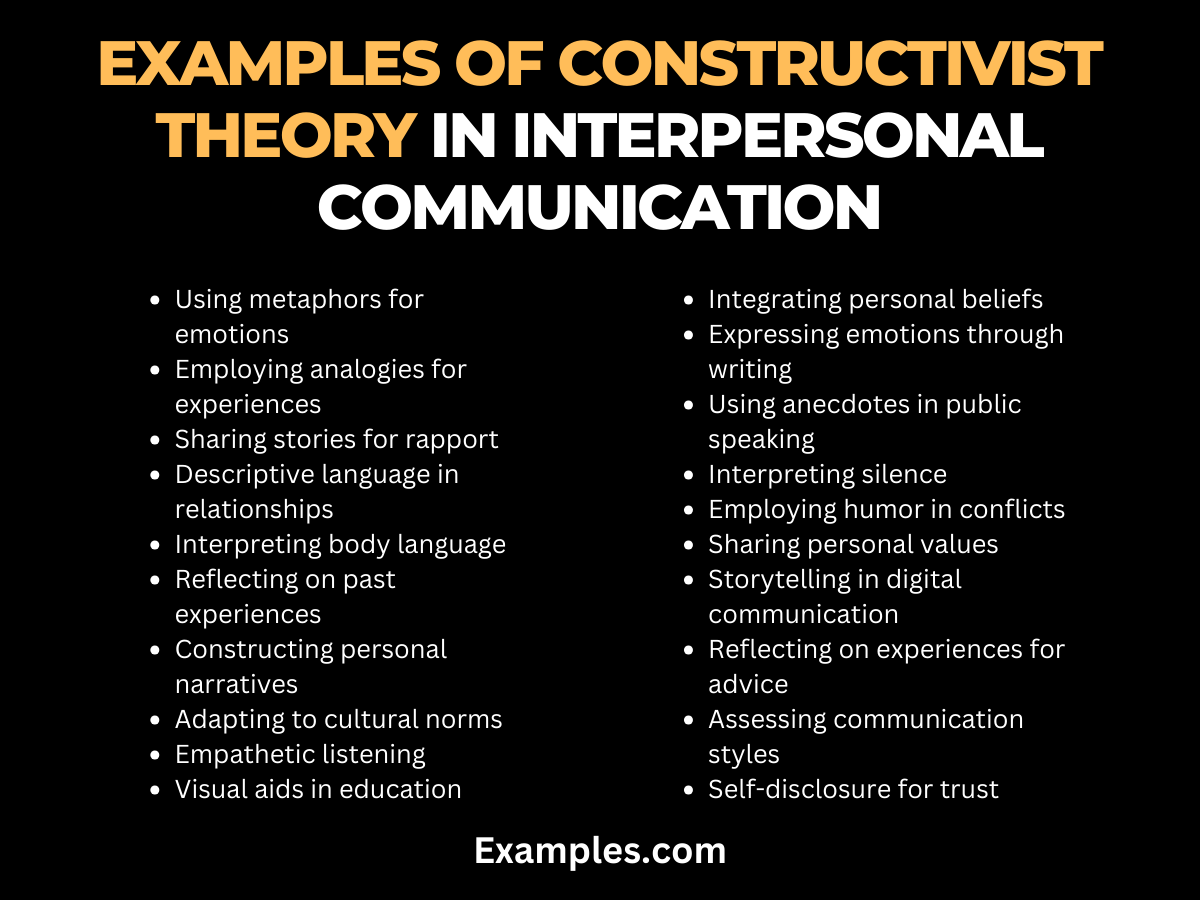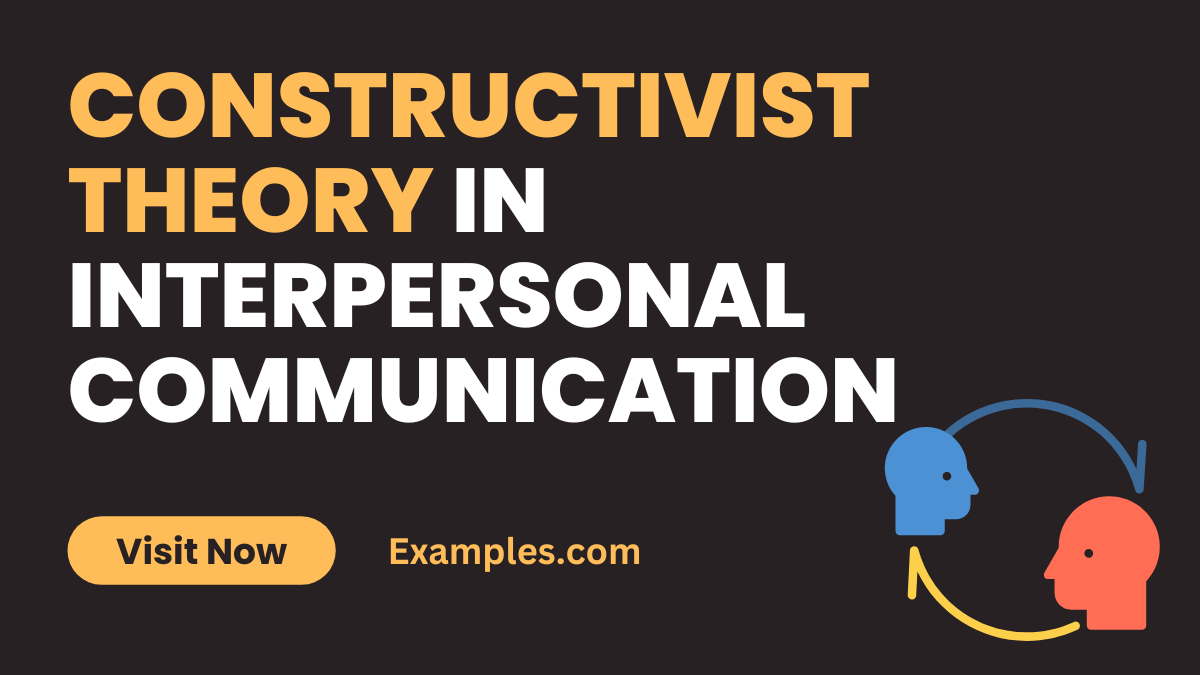19+ Constructivist Theory in Interpersonal Communication Examples
Delve into the fascinating world of Constructivist Theory in Interpersonal Communication with our in-depth guide. This approach offers a unique lens to view and understand the intricate dynamics of human interactions. It emphasizes how personal experiences and perceptions shape the way we communicate with others. By exploring this theory, you’ll gain valuable insights into the complexities of human communication, enhancing both personal and professional relationships.
What is the Constructivist Theory in Interpersonal Communication?

Constructivist Theory in Interpersonal Communication is a ground breaking framework that examines how individuals construct their own realities through communication. It posits that our understanding of the world is shaped by our interactions with others, and these interactions are influenced by our personal experiences, culture, and beliefs. This theory emphasizes the role of individual perceptions in shaping communication dynamics, making it a critical concept in understanding and improving interpersonal interactions.
History
Who Created: George Kelly
Date: 20th century
Kelly introduced the concept of personal constructs, emphasizing that individuals create their own unique systems of understanding the world. He proposed that our perceptions and interpretations of events are shaped by these personal constructs. Over time, this theory has evolved and found applications in various fields, including communication, where it highlights the role of subjective meanings and perceptions in shaping interactions.
Best Example of Constructivist Theory in Interpersonal Communication
A prime example of the Constructivist Theory in action is seen in conflict resolution scenarios. When individuals with differing perceptions and backgrounds engage in a dialogue, they use their personal experiences and understandings to construct a shared reality. This process, rooted in constructivist principles, allows for a deeper understanding and resolution of conflicts, showcasing the theory’s practical application in everyday communication
20 Examples of Constructivist Theory in Interpersonal Communication

Constructivist Theory in Interpersonal Communication is a profound approach emphasizing the unique ways individuals perceive, comprehend, and share experiences in communication. This theory underlines the role of personal constructs in shaping communication behaviors and understanding. It’s instrumental in Interpersonal Communication at Workplace and Interpersonal Communication in Relationship, where subjective perceptions and meanings influence interactions.
- Using metaphors to convey complex emotions: “Your support is like a solid rock that helps me stay grounded.”
- Employing analogies to explain personal experiences: “Navigating this issue feels like trying to solve a puzzle.”
- Sharing personal stories to build rapport in small group communication: “My journey to this point has been like climbing a mountain, full of challenges and triumphs.”
- Using descriptive language to express feelings in a relationship: “Your smile is a bright light in my day.”
- Interpreting body language to understand non-verbal cues: “Her crossed arms suggested she was defensive.”
- Reflecting on past experiences to guide current decisions in business communication: “This situation reminds me of a project last year where we took a similar approach.”
- Constructing narratives to make sense of personal histories in therapy sessions: “My childhood experiences shaped my perspective on relationships.”
- Adapting communication style to align with cultural norms in intercultural interactions: “In my culture, direct eye contact is a sign of respect.”
- Using empathetic listening to understand a colleague’s perspective: “I hear your concern and understand why this is important to you.”
- Employing visual aids to enhance understanding in educational settings: “This diagram illustrates the concept more clearly.”
- Integrating personal beliefs in discussions about social issues: “My faith teaches me the importance of compassion in these situations.”
- Expressing emotions through creative writing to share personal experiences: “My poem captures the essence of my journey.”
- Using personal anecdotes to enhance public speaking engagements: “Let me share a story that perfectly illustrates this point.”
- Interpreting silence as a form of communication in sensitive conversations: “Your silence speaks volumes about your discomfort.”
- Employing humor to diffuse tension in interpersonal conflicts: “Sometimes, you just have to laugh at the absurdity of it all.”
- Sharing personal values to find common ground in negotiations: “Honesty is a key value for me in this agreement.”
- Utilizing storytelling to connect with audiences in digital communication: “Let me tell you about a time when I faced a similar challenge.”
- Reflecting on personal experiences to offer advice in mentoring relationships: “When I was in your position, I found it helpful to…”
- Assessing personal and others’ communication styles to improve team dynamics: “I notice we both communicate differently, let’s find a middle ground.”
- Employing self-disclosure to build trust in interpersonal relationships: “I want to share something personal with you to deepen our connection.”
What are the Principles of Constructivist Theory in Interpersonal Communication
The Constructivist Theory in Interpersonal Communication focuses on how individuals create, interpret, and transform their communication experiences based on their personal histories and interactions. Here are eight key principles:
- Personal Constructs: Individuals develop unique perceptions or personal constructs through their interactions, shaping how they communicate and interpret messages.
- Interactive Co-creation: Communication is a co-creative process where meanings are negotiated and constructed during the interaction.
- Role of Experience: Past experiences significantly influence how a person understands and engages in interpersonal communication.
- Subjectivity of Perception: Each person’s perception of reality is subjective, leading to varied interpretations of the same communication scenarios.
- Cognitive Complexity: Higher levels of cognitive complexity enable individuals to perceive multiple dimensions in interpersonal interactions, leading to more effective communication.
- Cultural and Social Influences: Cultural and social backgrounds deeply impact the construction of meanings in interpersonal communication.
- Adaptive Communication: Effective interpersonal communication requires adapting messages according to the listener’s perspective and context.
- Reflective Thinking: Continuous reflective thinking is crucial for personal growth in communication skills, enabling individuals to understand and adjust their communicative behavior.
Constructivist Theory in Interpersonal Communication at Workplace
In the workplace, Constructivist Theory plays a pivotal role in shaping how communication occurs. Here are eight points demonstrating its application:
- Understanding Diverse Perspectives: Acknowledging and respecting diverse viewpoints and backgrounds among colleagues.
- Tailored Communication Strategies: Developing tailored communication strategies that consider the unique experiences and perceptions of team members.
- Conflict Resolution: Utilizing personal constructs to understand different perspectives, aiding in effective conflict resolution.
- Enhancing Team Collaboration: Promoting open dialogue and mutual understanding to enhance team collaboration and productivity.
- Leadership Communication: Leaders using constructivist principles to communicate effectively with their teams, understanding each member’s viewpoint.
- Feedback Mechanisms: Constructive feedback mechanisms that consider individual communication styles and perceptions.
- Adapting to Change: Ability to adapt communication strategies in response to changing workplace dynamics.
- Cultural Sensitivity: Emphasizing cultural sensitivity in communication to foster an inclusive workplace environment.
Constructivist Theory in Interpersonal Communication for Students
For students, the Constructivist Theory offers a framework to enhance their interpersonal communication skills. Here are eight relevant points:
- Peer Learning: Encouraging peer learning through sharing and understanding diverse perspectives.
- Self-Reflection: Promoting self-reflection to understand how personal experiences influence communication.
- Active Listening: Developing active listening skills to better interpret and respond to peers and educators.
- Collaborative Projects: Using collaborative projects to practice and improve interpersonal communication skills.
- Cultural Awareness: Cultivating cultural awareness and sensitivity in communication with diverse student groups.
- Conflict Management: Learning to manage conflicts constructively through understanding differing viewpoints.
- Adaptive Communication: Adapting communication styles to suit various learning environments and group dynamics.
- Feedback Reception: Encouraging open-mindedness in receiving and utilizing feedback for personal communication growth.
Constructivist Theory in Interpersonal Communication is essential. By following the provided tips and guidelines, you can effectively convey this theory in your writing. Encourage readers to explore the dynamic nature of communication, emphasizing the co-construction of meaning and the role of context. Mastering this theory enriches interpersonal communication knowledge and fosters more meaningful and adaptable interactions.



